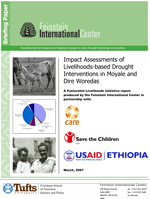The Pastoralist Livelihoods Initiative (PLI) is a two-year program funded by USAID Ethiopia which combines field level implementation and learning in pastoral areas, with the development of national guidelines for livelihoods-based livestock relief interventions with the Ministry of Agriculture and Rural Development. From late 2005 into 2006 a severe drought affected some pastoral areas of southern Ethiopia, and PLI government and NGO partners intervened with various types of livestock-related assistance. With the intention of informing policy dialogue and contributing to the national guidelines, impact assessments were then conducted in two woredas. The impact assessments combined descriptions of project activities (sometimes called ‘process monitoring’) with the systematic use of participatory methods to capture local perceptions of benefits.
Impact Assessments of Livelihoods-based Drought Interventions in Moyale and Dire Woredas

March 2007
ASSOCIATED PROJECT
SUBJECTS
PUBLICATION TYPE
LOCATION
RELATED PUBLICATIONS
The time pressure involved in designing and implementing anticipatory action can discourage the localization of decision-making. Learn more from a cartoon-infused summary of insights.
•
July 2024
Early Warning Systems can reduce deaths and damages caused by extreme weather events, if investors address gaps in communication and planning. Learn more from a cartoon-infused summary of insights.
•
July 2024
This synthesis report reflects upon Phase 1 findings on humanitarian action in pastoral drylands of the Greater Horn and Sudano-Sahel.
•
June 2024
This desk study examines common perceptions of pastoralism among humanitarians and barriers to international humanitarian systems meeting pastoralists’ needs.
•
June 2024
This desk study explores how state-owned policies and programs in pastoral areas of the Sudano-Sahel and the Greater Horn of Africa meet pastoralists’ needs and priorities.
•
June 2024
This desk study explores how pastoralists manage climate, conflict, and other stresses through indigenous early warning systems, preventive actions, local emergency responses, and customary safety nets.
•
June 2024






